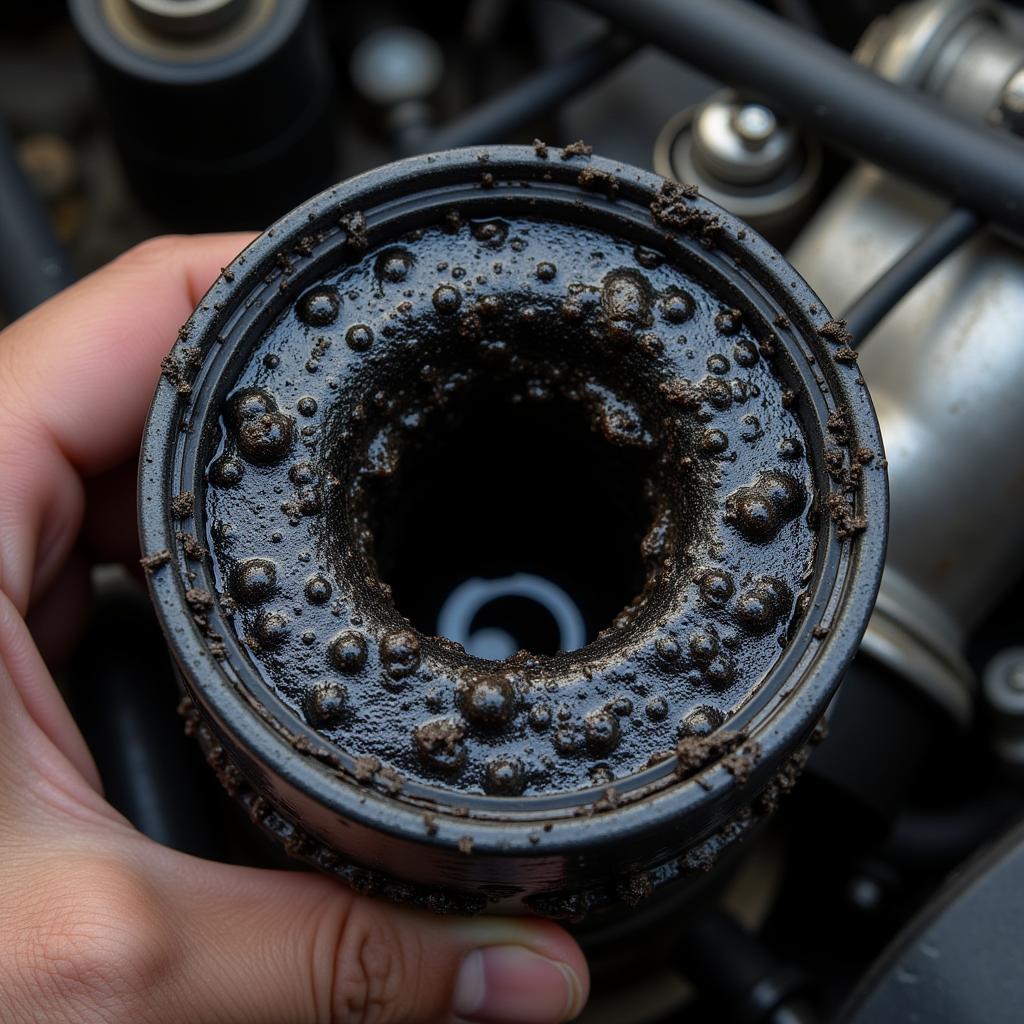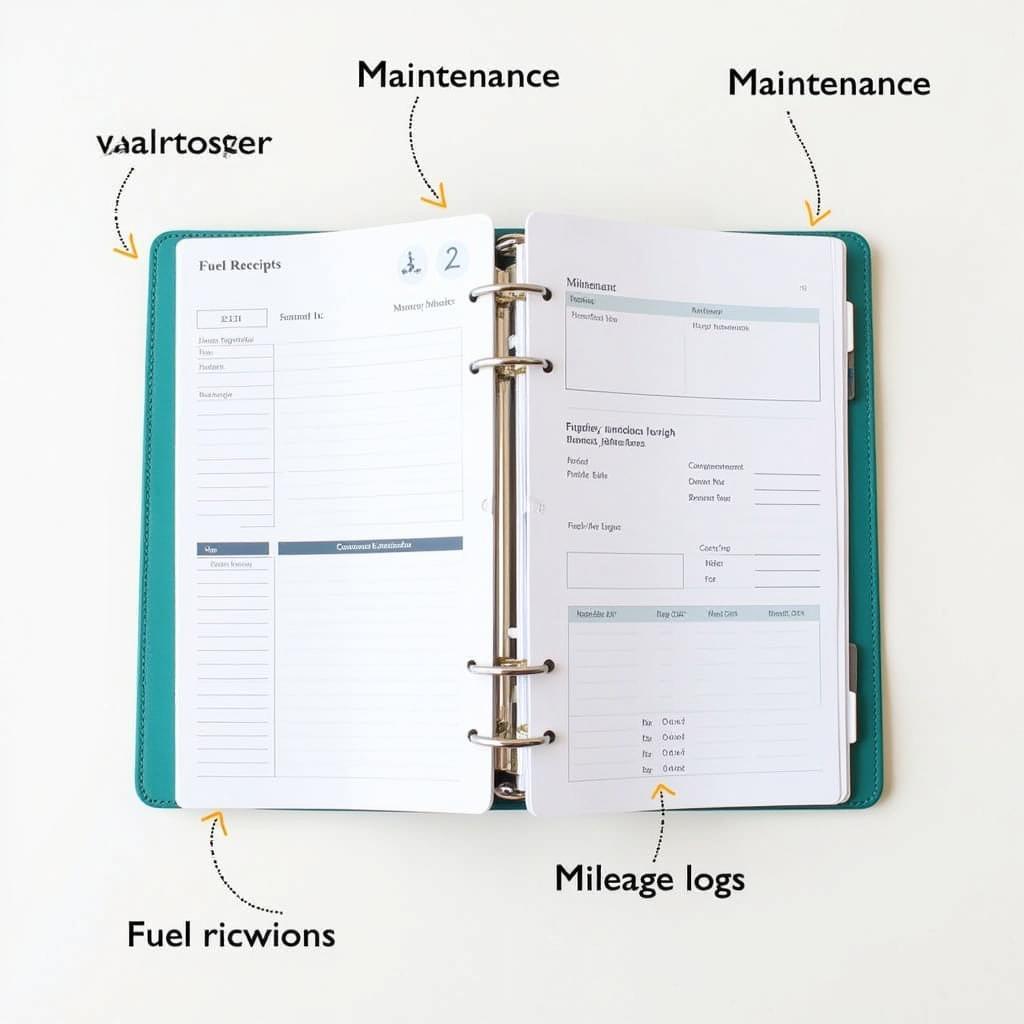Oil filter problems can significantly impact your car’s performance and longevity. Understanding these issues, their causes, and solutions is crucial for maintaining your vehicle’s health. This guide will delve into common oil filter problems, how to diagnose them, and offer practical solutions.
 Clogged Oil Filter Leading to Engine Issues
Clogged Oil Filter Leading to Engine Issues
Why are oil filters so important? They trap contaminants that can damage your engine, ensuring smooth operation. A malfunctioning oil filter can lead to decreased performance, increased wear and tear, and even catastrophic engine failure. Ignoring oil filter problems can quickly turn a minor inconvenience into a costly repair.
Common Oil Filter Problems and Their Symptoms
Oil filter problems manifest in various ways. Recognizing these symptoms is the first step towards addressing the issue:
- Low Oil Pressure: This is often indicated by a warning light on your dashboard. Low oil pressure can be caused by a clogged filter restricting oil flow. What should you do if your oil pressure light comes on? Immediately pull over and check your oil level. If the level is fine, a clogged filter may be the culprit.
- Dirty Oil: If your oil appears excessively dirty even after a recent change, it could indicate a filter bypass valve issue, allowing unfiltered oil to circulate. How can I tell if my oil is dirty? Check the dipstick – clean oil should be translucent and amber-colored. Dirty oil looks dark and gritty.
- Engine Overheating: A restricted oil flow due to a clogged filter can lead to inadequate lubrication and increased engine temperature. Why is my car overheating? Several factors can contribute, but a clogged oil filter preventing proper oil circulation is a common one.
- Unusual Engine Noises: If you hear knocking or ticking sounds coming from your engine, it could be a sign of insufficient lubrication caused by a faulty oil filter. gm troubleshooting car problems can sometimes be related to oil filter issues.
Diagnosing Oil Filter Problems
Pinpointing the exact oil filter problem requires a systematic approach:
- Check the Oil Pressure: Use a pressure gauge to verify if the oil pressure is within the manufacturer’s recommended range.
- Inspect the Oil Filter: Look for leaks, dents, or any visible damage to the filter housing.
- Analyze the Oil: Examine the oil for signs of contamination or metal shavings, which could indicate internal engine damage.
How to Fix Oil Filter Problems
Most oil filter problems are easily resolved by replacing the filter. Here’s how:
- Gather the necessary tools: You’ll need a new oil filter, a wrench, an oil drain pan, and fresh oil.
- Locate the oil filter: Consult your car’s manual for its specific location.
- Drain the old oil: Remove the oil drain plug and let the old oil drain completely.
- Remove the old filter: Use the wrench to loosen and remove the old filter.
- Install the new filter: Lubricate the gasket of the new filter and screw it on by hand until snug. Then tighten it with the wrench according to the manufacturer’s instructions.
- Refill with fresh oil: Add the correct amount of oil specified in your car’s manual.
- Start the engine: Let it run for a few minutes and check for leaks.
If you encounter more complex issues, like a faulty bypass valve, it’s best to consult a qualified mechanic. car having problems starting can also be attributed to oil-related issues, although it’s less common.
“Regular oil and filter changes are the cornerstone of preventative maintenance,” says John Miller, a veteran automotive engineer with over 20 years of experience. “Don’t underestimate the importance of this simple procedure in protecting your engine.”
Preventing Oil Filter Problems
Preventing oil filter problems is easier than fixing them. Follow these tips:
- Regular Oil Changes: Adhere to your car’s recommended oil change intervals.
- Use Quality Oil Filters: Don’t skimp on quality. Choose filters from reputable brands. tata car problems can be mitigated with regular maintenance, including using quality oil filters.
“Using a high-quality oil filter can significantly extend the life of your engine,” adds Sarah Johnson, a certified mechanic and automotive instructor. “It’s a small investment that pays off in the long run.” top 5 worst car problems ever often stem from neglecting basic maintenance, like regular oil and filter changes. pizza delivery car problems can highlight the importance of regular maintenance, including oil filter changes.
Conclusion
Oil Filter Problems Cars can range from minor annoyances to major engine damage. Understanding these problems, their symptoms, and how to address them is essential for any car owner. By following the advice outlined in this guide, you can ensure your car runs smoothly and avoid costly repairs. Contact AutoTipPro at +1 (641) 206-8880 or visit our office at 500 N St Mary’s St, San Antonio, TX 78205, United States for any further assistance.






Leave a Reply